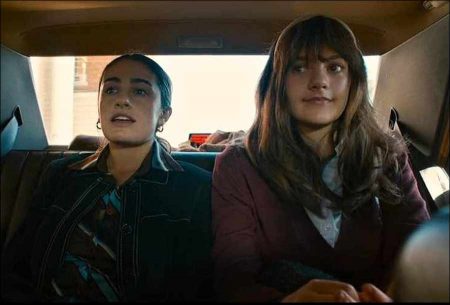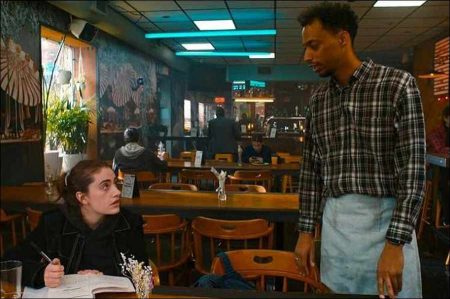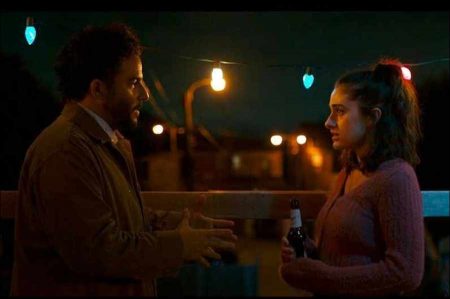I Used To Be Funny is a dark dramedy that follows Sam Cowell (Rachel Sennott), an aspiring stand-up comedian and au pair struggling with PTSD, as she decides whether or not to join the search for Brooke (Olga Petsa), a missing teenage girl she used to nanny. The story exists between the present, where Sam tries to recover from her trauma and get back on stage, and the past, where memories of Brooke make it harder and harder to ignore the petulant teen’s sudden disappearance.
In the present day storyline, Brooke is missing, and Sam is struggling with PTSD and no longer performing comedy. Through a series of flashbacks we learn how Sam’s relationship with Brooke and her family deteriorates. As Sam and Brooke become close, Sam becomes more enmeshed in the family.
Brooke’s father is oblivious to the appeal of Sam’s comedy initially, but later appears to warm to it more, showing his friends clips of her performances online, which include content around her dating and sex life. Brooke’s mother dies, and Brooke and Cameron grieve their loss, with Cameron shown to be drinking more.
I Used to Be Funny is a 2023 Canadian comedy-drama film written and directed by Ally Pankiw. The film stars Rachel Sennott as Sam, a stand-up comedian living in Toronto who is struggling with depression that has impacted her career after Brooke (Olga Petsa), a young girl for whom she previously served as a nanny, goes missing. Sabrina Jalees, Caleb Hearon, Ennis Esmer, Dani Kind, and Jason Jones also star.
I Used to Be Funny premiered at the South by Southwest festival on March 13, 2023, distributed by Levelfilm in Canada. It later screened at the Inside Out Film and Video Festival in May. That August, Utopia acquired distribution rights in the United States. At the 2023 Woodstock Film Festival, it screened on September 28 and October 1, 2023. The film was released in the United States and in Canada on June 7, 2024.
On the review aggregator website Rotten Tomatoes, 82% of 50 critics’ reviews are positive, with an average rating of 7/10. The website’s consensus reads: “Bringing a droll edge to deeply serious subject matter, Ally Pankiw’s feature length debut provides Rachel Sennott a welcome opportunity to display her dramatic range.” Metacritic, which uses a weighted average, assigned the film a score of 74 out of 100, based on 12 critics, indicating “generally favorable” reviews.
Film Review for I Used to Be Funny
Rachel Sennott is ideally cast in the leading role of Ally Pankiw’s “I Used to Be Funny” because this is a character who sort of can’t help but make you laugh, even without trying, even in tremendously difficult situations. Her name is Sam, and she’s a stand-up comedienne (“Like a comedian, but a girl!” she explains, cheerfully), and you see why.
The bone-dry wit and killer-diller timing Sennott displayed in “Shiva Baby” and “Bodies Bodies Bodies” means that even her littlest throwaway lines and deliveries are giggle-worthy (“I’m gonna go lay down… in my towel” is not a funny line, but she gets a laugh with it), while her insults land like body blows (“I feel like his hair somehow got more incel-y”).
It’s impossible to overstate the importance of that quality, that offhanded wittiness, to what Pankiw sets out to do because the title is loaded: “I Used to Be Funny” is filled with amusing moments, but it is very much a drama, about a horrible thing that happened to someone who, side note, used to be a comedian, and does not find much to laugh about anymore. She lives in Toronto with a couple of other comics, and the scenes of them just hanging out and talking shop have a lived-in authenticity (“I feel like your youth minister stuff could still work?”). She’s trying to write and trying to work and trying to get her life back on track, but she can’t go on stage anymore, and eventually, we find out why.
One must emphasize the eventually part because Pankiw’s screenplay conceals the exact events that shipwrecked her life and made her a social media cause celebre until very late in the picture — too late, perhaps, at least for some viewers (and maybe for this one). It’s hinted, as these things often are, in coded language and inexplicable incidents; she’s captivated by a TV news report of Brooke (Olga Petser), a 14-year-old runaway, missing for four days, who soon turns up at her door to throw things and call Sam a liar. Her roommate cautions her not to get sucked in — “You’re not getting paid to worry about her anymore” — amid mysterious mentions of what she’s “been through”; the film keeps circling what that is, dropping clues but not coming out with it.
In flashbacks, we get some background into who Brooke is and what this all means. Sam’s day job is nannying, and she cared for Brooke, initially a confused 12-year-old whose parents were going through a rough breakup. (Jason Jones, playing it very straight, is quite good as the dad.) Because Brooke was right on the edge of needing child care at all, her relationship with Sam is more like a sibling one, which is part of why their break seems so loaded; whatever happened, it ended badly between the two of them, a drama underscored by their easy rapport earlier in the relationship.
We also see Sam on stage before ~everything that happened~, and those scenes scan; her level of relative fame makes sense, because she’s pretty funny, but not some kind of secret superstar. She’s reasonably successful and relatively happy — we see her in bed with her boyfriend, being jokey and sexy, in sharp contrast with their later, uncomfortable interactions. (“I just can’t be around you, ok?” she explains, in a scene that pointedly gets at the collateral damage of these experiences. “It just makes me feel like shit to be around the people who were there.”)
The flashbacks are reasonably well-integrated, though it takes a few scenes to hook into what they’re doing and where we are, and some of the stylistic devices to signal them are a little shopworn (there are copious echoing voices haunting the soundtrack). But the construction isn’t entirely effective. It ends up unwinding like a thriller, carefully hiding not a killer, but a secret, a device that borders on deception and tips into that territory — particularly near the end, when the details they’ve been withholding are released as easy exposition dumps in flat, pro forma courtroom scenes.
It’s not that it feels like a gimmick; victims of trauma often circle their memories in triggered flashes, and it’s easy to see how Pankiw is attempting to replicate that experience in a subjective way. And her insightful screenplay not only gets the very specific way people talk to each other in the aftermath of such a trauma but how its victims can take on A Project with single-minded determination, in order to take their minds off of everything (here, it’s Sam’s mission to track down Brooke in the skeezy teen underworld, to which her roommate warns, “Don’t… think about ‘Euphoria‘”). The reveal of Brooke’s anger, and the source of it, is genuinely well-executed — good writing, good acting — even if the double-tap feel-good ending is too, too much (pick one and go with it, for goodness’ sake).
Above all, “I Used to Be Funny” is a fine showcase for Sennott’s considerable gifts. The comic material, as noted, is unsurprising; she’s developing the camera sense and timing of a genuine movie star. The revelation here is her dramatic work; her breakdowns and spirals are quite credible, and occasionally heartbreaking, but her most impressive scenes are the quieter ones, in which we sense her trying, desperately, not to talk about things — or, even tricker, to seem like she doesn’t need to. It’s a wonderful performance, so good that it pulls the picture around it through its rougher patches.
I Used to Be Funny (2024)
Directed by: Ally Pankiw
Starring: Rachel Sennott, Olga Petsa, Jason Jones, Sabrina Jalees, Caleb Hearon, Ennis Esmer, Dani Kind, Hoodo Hersi, Dan Beirne, Stephen Alexander, Miguel Rivas, Marvin Kaye, Paloma Nuñez
Screenplay by: Ally Pankiw
Production Design by: Ciara Vernon
Cinematography by: Nina Djacic
Film Editing by: Curt Lobb
Costume Design by: Courtney Mitchell
Set Decoration by: Elizabeth Kennedy, Sabrina Rincon
Art Direction by: Tremé Manning-Céré
Music by: Aimee Bessada
MPAA Rating: None.
Distributed by: Levelfilm
Release Date: March 13, 2023 (SXSW), June 7, 2024
Views: 18






